📖 This is a long post and is best viewed online here.
👆 To get these updates in your inbox, subscribe to Footnotes and Tangents and turn on notifications for War and Peace 2024.
🎧 This post is now available as a podcast. Listen on Spotify, YouTube, Pocket Casts or wherever you get your podcasts.
Welcome to Week 46 of War and Peace 2024
This week, we have read Book 4, Part 3, Chapter 19 – Part 4, Chapter 6.
Everything you need for this read-along and book group can be found on the main War and Peace page of Footnotes and Tangents. There you will find:
The reading schedule with links to daily chat threads for each chapter.
Weekly updates like this one.

This week’s theme: Life After Death
For the first half of War and Peace, the Rostov house was the house of joy. Its life force lit up the page; words glittered with warmth and music, love and laughter. It was the best place to be, the book’s bright beacon.
That house and that light has gone. Petya is dead. His parents are shadows, and all that remains of Rostov joy is one small ember glowing in Natasha’s heart.
The final book of War and Peace opens with three of the best chapters in the entire novel. They ask the question: how do we live after someone has gone?
The news of Petya’s death fells his father. He who danced the Daniel Cooper now can barely stand, shuffling to a chair, sobbing convulsively; a child and an old man in one feeble body. Here is grief unbraiding a life from life.
Here is Countess Rostova, beating her head against the wall. She holds back the unimaginable, trying to unpick time with words. What is left is a wounded spirit that can not heal, for ‘death had torn from her half her life.’
Marya has lost her father and her brother. She and Natasha form a bond through their grief, guarding their open wounds to listen to the ‘dreadful choir’ of their imagination. Always a Bolkonsky, Marya’s duties recall her back to life.
Natasha believes in things eternal and absolute. Pure and complete joy eclipsed by pure and complete sorrow. Life after death is impossible, she thinks, until the responsibility of caring for her mother is thrust upon her. In love, she lives again.
At his lowest point, Pierre finds an inner vital force that nothing terrible can touch. Natasha finds it too. So ‘beneath the layer of silt that covered her soul … delicate young shoots of grass’ begin to grow.
After the fire, when Rostov joy is charred and ash. Something stirs and is reborn; green shoots growing. Life after death.
Chapter 19: Demanding The Impossible
Tolstoy examines the historians’ view that Russia failed in its aim to capture Napoleon and cut off the French army. He argues that this was not the army’s goal and this impossible demand was dreamed up by historians with hindsight, ‘sitting in warm rooms’, not understanding what it means to be fleeing for your life, or pursuing an enemy through the terrible Russian winter.
In its final stages, this chapter transforms from dry analysis to brilliant burning anger. So many histories of ‘the beautiful words’ of generals with no regard to the events:
The question of those fifty thousand men who were left in hospitals, and in graves does not even interest them, for it does not come within the range of their investigation.
Behind the statistics of war dead, there is Andrei; there is Petya. Tolstoy is condemning the historians (and leaders) of his day for a failure of imagination and compassion. Each of those fifty thousand has a story, and has family and friends left behind to mourn the dead and nurse the injured.
For Tolstoy, a true history of any war must listen to these stories. And so War and Peace is, in part, an attempt to capture the human history that had until his time been ignored.
Book 4, Part 4
Chapter 1: Spiritual Wounds
After Andrei’s death, Marya and Natasha’s grief brings them together. But while Natasha is stuck reliving her last days with Andrei, Marya’s responsibilities pull her back to life. She takes care of her nephew and their return to the Bolkonsky house in Moscow. Natasha regrets what she said and did not say to Andrei before he died, and as she tries to penetrate the mystery of death, news comes concerning her brother Petya.
But when it is a beloved and intimate human being that is dying, besides this horror at the extinction of life there is a severance, a spiritual wound, which like a physical wound is sometimes fatal and sometimes heals, but always aches and shrinks at any external irritating touch.
The previous chapter was about the parts of war that the history books leave out. This chapter zooms in and focuses on one of those stories: the inner wounds made by war on those left behind.
When they first met, Marya and Natasha did not understand or like one another. Now only they understand this irrevocable break in the universe. Tolstoy shows the strength of this shared feeling but also its impermanence. Marya is recalled to life and leaves Natasha behind. What they share does not last. Here is another of life’s trials, another loss after the loss of a life.
But pure and complete sorrow is as impossible as pure and complete joy.
This line tells us something about where this book is heading. Tolstoy won’t give us a happy or an unhappy ending. Life can’t be resolved like that. War and Peace has always been about life’s rainbow, its graduations of feeling, its contradictions and impermanence. The book seems to say: every moment matters, though it is broken and incomplete.
And now: here is Dunyasha with news of Petya.

Chapter 2: Natasha’s Vigil
In her isolation, Natasha first disregards the news of ‘a misfortune’ in the family. But on encountering her weak weeping father, she goes to help her mother, in a shrieking and violent delirium. Countess Rostova refuses to believe the news of her son’s death. For three nights, Natasha stays with her mother and on the third night, Countess Rostova finally begins to cry.
Natasha • Count Rostov • Countess Rostova
Her persevering and patient love seemed completely to surround the countess every moment, not explaining or consoling but recalling her to life.
First Marya then Natasha are called back to life. Natasha has done a lot of growing up these past few weeks. Being a carer will do that. And this vigil at her mother’s bedside is one of her finest moments.
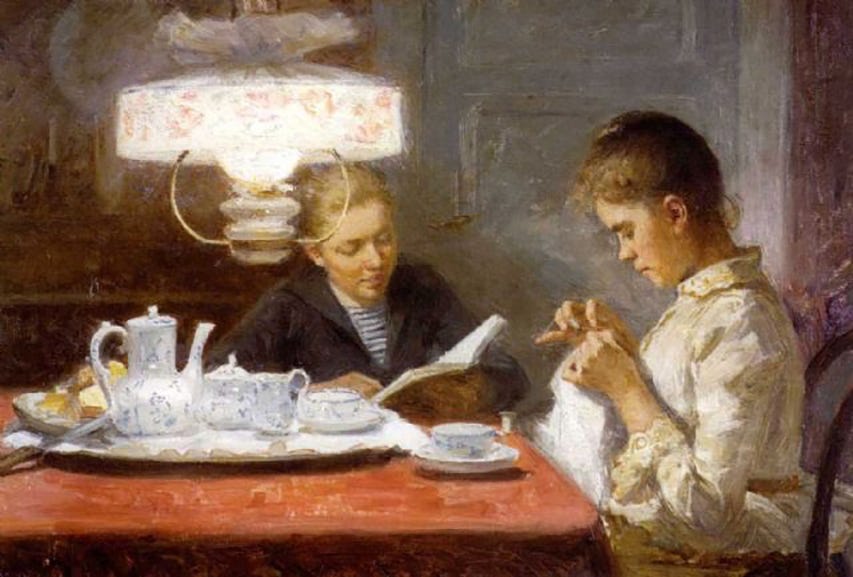
Chapter 3: The Vital Force
For three weeks Natasha remains at her mother’s side. Petya’s death inflicted a spiritual wound on his mother that never healed; Natasha’s role as her mother’s companion re-awakens her love and life. In the following weeks and months, she and Marya become close friends. Natasha grows thin and weak but her vital force heals her wound within. In January, Marya, Natasha and the count travel to Moscow.
Marya • Natasha • Count Rostov • Countess Rostova
She did not know and would not have believed it, but beneath the layer of silt that covered her soul and seemed to her impenetrable, delicate young shoots of grass were already sprouting, which, taking root, would so cover with their living verdure the grief that weighed her down that it would soon no longer be seen or noticed.
Something about Natasha and Marya’s friendship reminds me of Andrei and Pierre. They recognise that they are very different people but admire and value those differences.
Note also that Pierre and Natasha have reached the same conclusion: love is the essence of life.
But this chapter is bittersweet. It is heart-rending to read that Countess Rostova will never recover from her grief. It is consoling to know that Natasha comes out of this stronger, and that this regrowth is made possible by the love of two women, her mother and Marya Bolkonskaya. But I can’t help wondering, where is Sonya in all of this?
How have grief and loss changed Marya and Natasha? How are their experiences different? And how do your own life experiences affect how you read these chapters?
Sonya is conspicuously absent from these chapters. What do you think she makes of Natasha and Marya’s friendship?

Chapter 4: The Weak Old Courtier
History acclaims Napoleon as grand, and Kutuzov is the ‘crafty, dissolute, weak old courtier’ who prevented anything from being achieved by the Russian army. Tolstoy maintains the opposite: seeing that there is nothing to be gained by acts of heroism, Kutuzov did what he could to save lives by pursuing the French at a distant and slackening pace.
These men, carried away by their passions were but blind tools of the most melancholy law of necessity, but considered themselves heroes and imagined that they were accomplishing a most noble and honourable achievement.
As Tolstoy saddles up his hobby horse, we take with us those solemn scenes from the the Rostov house of grief. From the specific to the general: the commander-in-chief is labouring to lessen the burden of grief descending on thousands of families like the Rostovs.
It is as though there are two wars taking place. The one between the Russians and the French is a mirage, worse than meaningless. But there is a far more significant struggle between life and death, and those ‘heroes’ of Krasnoi are on the other side to the weak, old courtier, Mikhail Kutuzov.
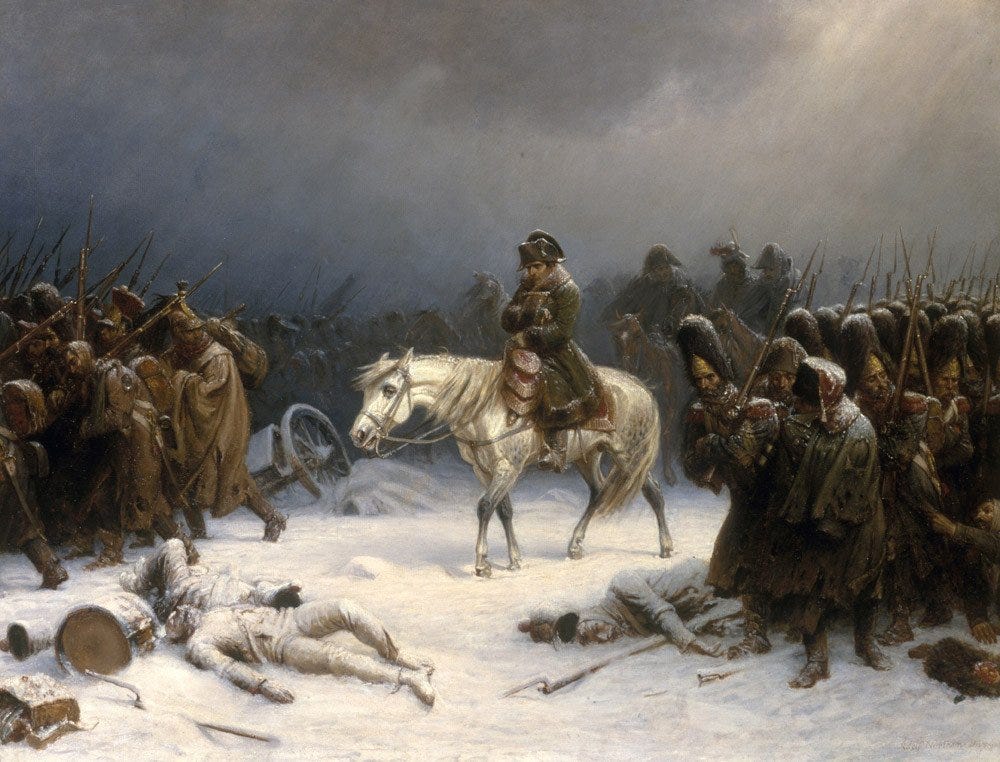
General Winter?
Tolstoy’s Kutuzov maintains that the French army is destroying itself, and very little good (and much harm) is done by senseless engagements. The catastrophic fate of Napoleon’s army was famously depicted in a map by the French civil engineer Charles Minard:
The map is a graphical presentation of the direction and distance travelled by the Grande Armée, its diminishing size and the fall in temperature as winter set in. Information scientists often cite Minard’s map as one of the best statistical graphics ever drawn.
Napoleon’s defeat is often attributed to ‘General Winter’ and many of the paintings commemorating the campaign focus on the snow drifts and deathly ice. At this point in our story, the weather conditions are appalling. But Minard’s map shows that the Grande Armée had already lost most of its troops before the first frosts.
A greater factor was probably those lice that Pierre endured a few chapters ago. They carried typhus, a microbe responsible for 80,000 deaths within the first month of the campaign. The French invasion may have been undone not by snow or Russian artillery but by lice, microbes and poor sanitation. Such a conclusion works well with Tolstoy’s overall thesis that history is the result of illimitable factors beyond any individual’s control.
Writing for Slate, history writer Joe Knight wondered whether there might be artistic implications for this victory for microorganisms:
Most Americans are familiar with the ending of Tchaikovsky’s 1812 Overture, commissioned by Russia to celebrate Russia’s defeat of Napoleon. The musical score ends with the sounds of cannons booming and bells pealing; however, if Tchaikovsky wanted to accurately record the sound of Napoleon’s defeat, one would only hear the soft, quiet sound of lice munching on human flesh. An organism too small to be seen by the human eye had changed the course of human history.
Further resources:
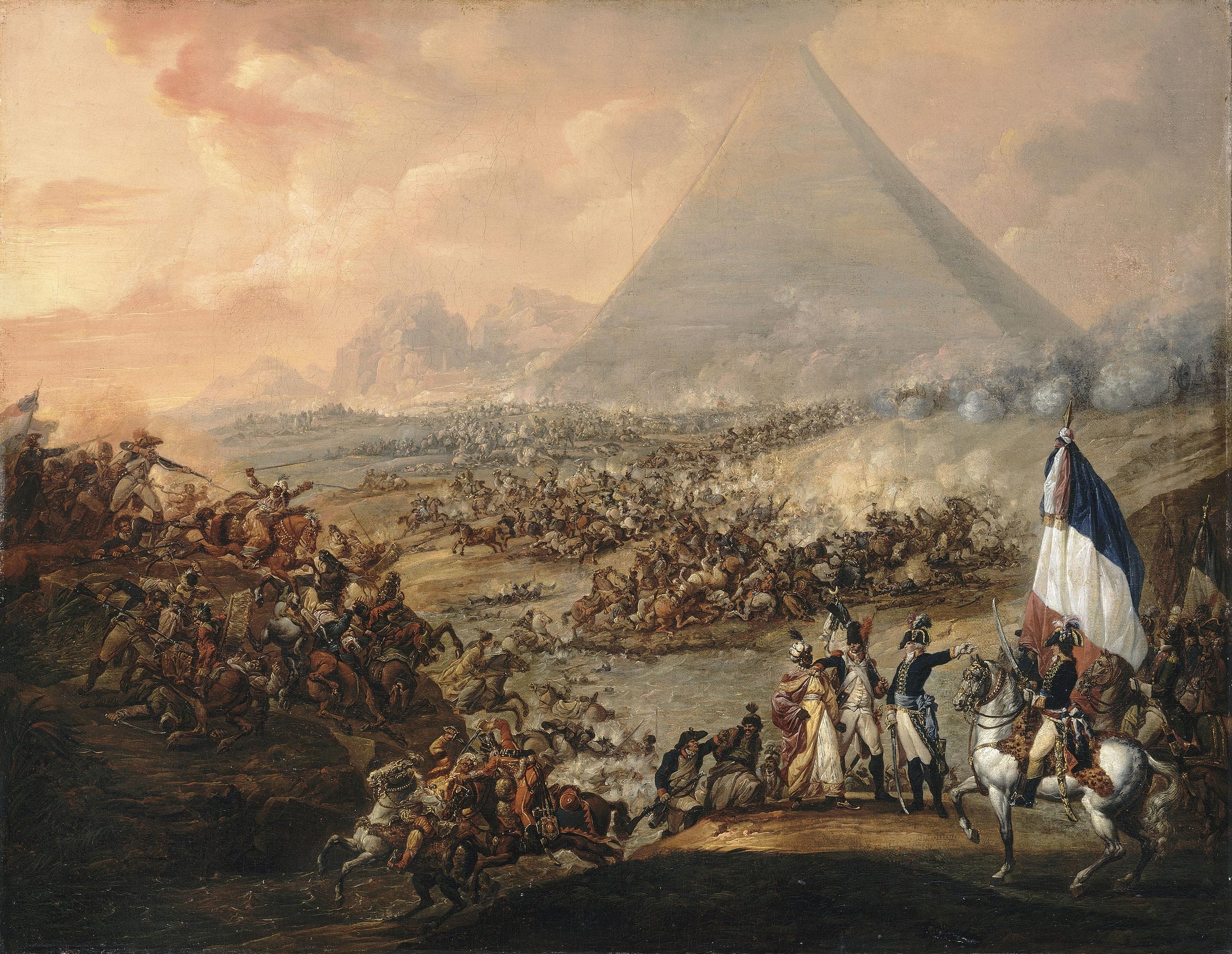
Chapter 5: The Great Procrastinator
Tolstoy continues his passionate defence of Kutuzov’s legacy. He made no grand gestures or bold poses. He was an ordinary man in tune with a ‘national feeling,’ who did his job to the best of his ability. Time and patience; and if in doubt, do nothing. He does not fit the mould of a heroic leader, but he was, in Tolstoy’s opinion, ‘truly great.’
To a lackey no man can be great, for a lackey has his own conception of greatness.
If in doubt, don't aim to please. Don't waste time correcting other’s impressions. Don't go for glory. Don't fight every battle. If in doubt, wait and see.
What do you make of Tolstoy’s concept of greatness?
On avoiding battles
Tolstoy reminds us that Governor-General Rastopchin met Kutuzov after Moscow was abandoned. In Book 3, we saw this exchange from Count Rastopchin’s point of view. Now we see it through Kutuzov’s eyes:
When Count Rastopchin at the Yauza bridge galloped up to Kutuzov with personal reproaches for having caused the destruction of Moscow, and said: ‘How was it you promised not to abandon Moscow without a battle?’ Kutuzov replied: ‘And I shall not abandon Moscow without a battle’, though Moscow was then already abandoned.
Kutuzov deals with personal confrontations the same way he leads the military campaign: he avoids battle. He lies and denies Rastopchin the opportunity for an argument. No wonder he was considered a crafty politician.
What is interesting is that Tolstoy appears to admire this dishonesty. This is odd in a book so derisive of dishonest and diplomatic speech. But Tolstoy regards the thoughts, words and actions of generals as meaningless. It is far better to say something silly to avoid a fight than to let pride trick you into thinking your words matter more than they do. Tolstoy writes:
Not merely in these cases, but continually, did that old man—who by experience of life had reached the conviction that thoughts, and the words serving as their expression, are not what move people—used quite meaningless words that happened to enter his head.
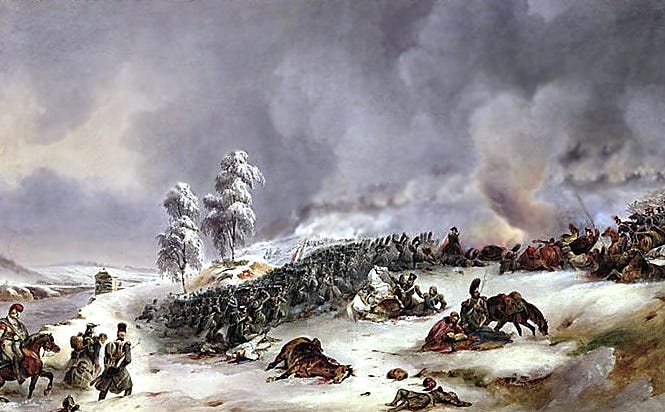
Chapter 6: An Ordinary Old Man
On the first day of the battle of Krasnoi, Kutuzov rides to his headquarters at Dobroe. Generals report to him, but he appears preoccupied and is distracted by the sight of French prisoners by the roadside. He gives a speech to a regiment, and voices sympathy for the plight of the French. His simple-hearted talk is well-received if ‘hardly understood’ by the troops, and afterwards, he appears ‘evidently greatly moved.’
‘They are human beings too. Isn't it so, lads?’
Kutuzov is required to give a speech; something for posterity and the history books.
But he's just seen the look in the French prisoners' eyes and he can't get it out of his head. What's the use in posterity when their fellow humans are suffering needlessly?
Everything that makes Kutuzov forgettable to historians, makes him memorable for a novelist.
On speeches
Tolstoy contrasts Kutuzov’s incoherent speech at the Battle of Krasnoe with Napeoleon’s famous words before the Battle of the Pyramids:
Soldiers! You came to this country to save the inhabitants from barbarism, to bring civilisation to the Orient and subtract this beautiful part of the world from the domination of England. From the top of those pyramids, forty centuries are contemplating you.
For a writer who doesn't like Great Men, Tolstoy does a good job of making one man great. Kutuzov emerges from these chapters as a man slandered or forgotten by historians but remembered and celebrated by the novelist. Tolstoy was responding to two recently published assaults on Kutuzov’s legacy. The accusation that the Russian general took bribes from Napoleon comes from the posthumously published diaries of Sir Robert Thomas Wilson, a British officer. And Kutuzov had been recently described as a ‘cunning court liar’ by a military historian with the brilliant name Modest Ivanovich Bogdanovich.
Further resources:
Thank you for reading
Thank you for reading and joining me on this slow read of War and Peace.
Before I go, a reminder that I am looking for testimonials to recommend this read-along to readers joining us in 2025. If you can help, just drop me a DM on Substack, send me an email or leave a comment below. And if you have enjoyed this post and found it helpful, please consider leaving me a tip over on Stripe. These donations always make my day and remind me that this project is worthwhile and finding a good home.
And that’s all for this week. I love reading your thoughts in the comments and the chat threads. Have a great week, and I’ll see everyone here next Sunday for more War and Peace 2024.




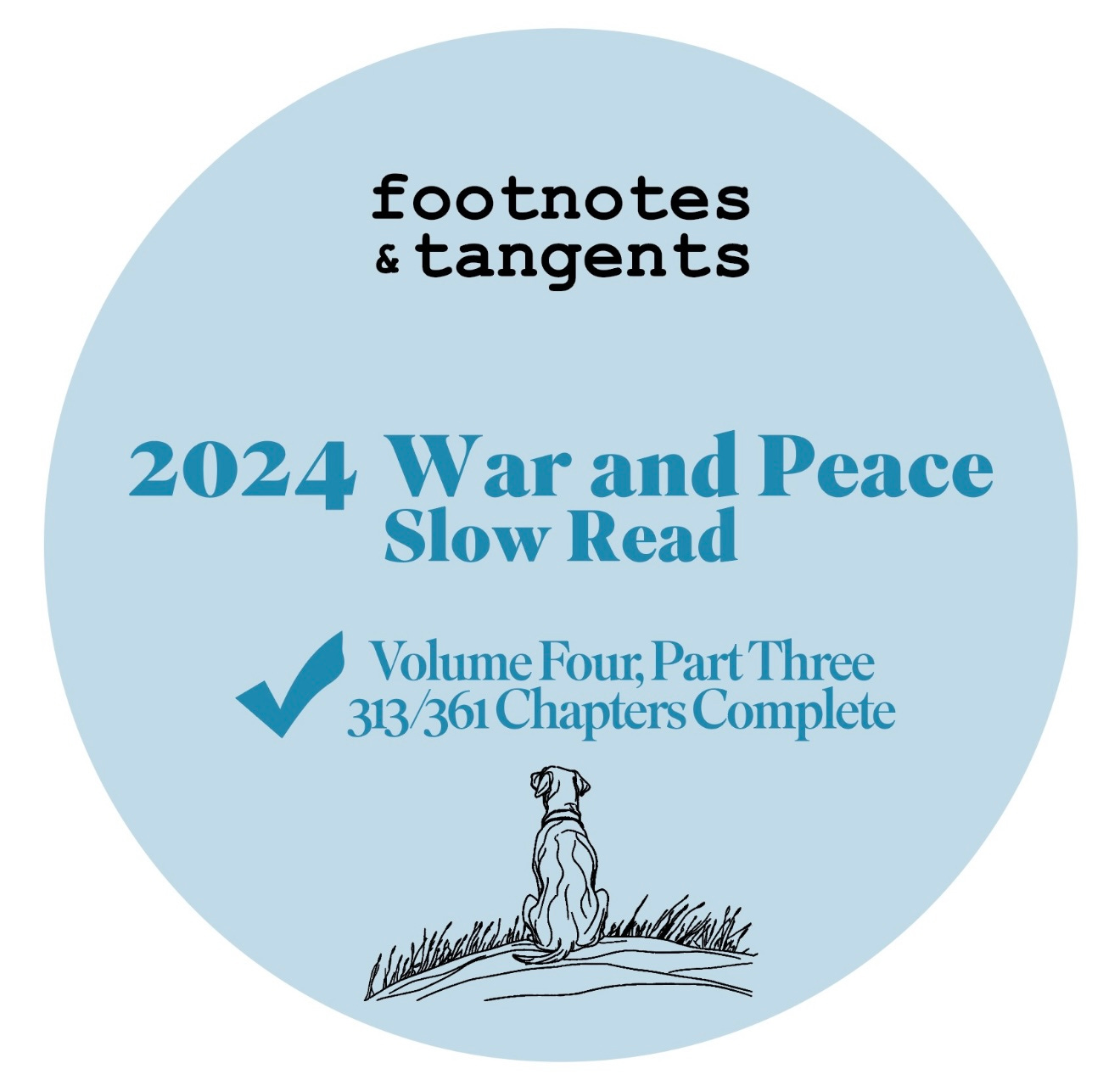

I am reading a wonderful nonfiction book — “A Walk in the Park: The True Story of a Spectacular Misadventure in the Grand Canyon” by Kevin Fedarko. As has so regularly happened this year, W&P is on my mind as I read passages like this: “Sooner or later, every difficult journey collides against a moment that crystallizes the imperative of accepting that the outcome of any ambitious undertaking can neither be ordained nor engineered by its participants, and that the heart of an odyssey is reached — and its deeper truths begin to reveal themselves — only after the illusion of control is permitted to fall away and disappear into the gathering night, like a loose pebble over a cliff.”
Fedarko’s thoughts remind me of Tolstoy’s beliefs. But mostly — as my journeys through the Grand Canyon and W&P near their ends — I am grateful to embrace our deeper truths. Love and kindness chief among them. I’m in awe of how Tolstoy delivered us to this place. I especially admire his rendering of Kutuzov, who joins my list of favorites in the book. Thanks again, Simon, for thoughtfully guiding us this week. Onward!
I feel for Sonya in these chapters. I suspect she must feel excluded from the friendship that has formed between Natasha and Mayra and she cannot be spared from being upset at Petya's death. I hope we learn soon how she is faring.